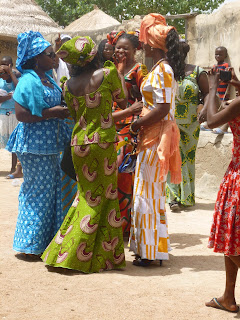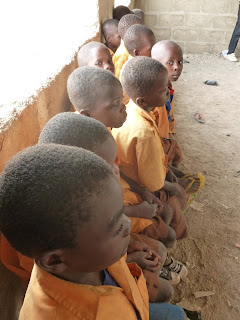Training GES staff and teachers is the logical next step
after screening and referrals. To date we have focused on a preparatory session
on disability rights, actual classroom management and methodologies coming
later.
 |
| Haruna and I training the Circuit Supervisors, the local inspectorate of schools. |
 |
| A lunch time discussion:-teachers must uphold the rights of every child- to life, to education , to social participation. Teachers must explain disabilities using scientific and medical terms- modern Ghana has outlawed traditional spirit practices. |
In parts of northern Ghana, alongside medical advances, the
introduction of routine ante natal and post natal care, and an encouragement to
attend hospital for childbirth, traditional beliefs persist, below the surface,
explaining a child born with disabilities, apportioning blame and guiding
courses of action. If a pregnant mother sleeps outside in full moonlight, her
baby may be born blind; if she bathes in a certain river, or similarly other
innocent and random activities, any disability in the child may allegedly
result. Most seriously, although this
practice is not openly talked of, difficult to quantify and increasingly
challenged, the child born with disability is described not as a child but as a
“spirit”, and as such must be returned to the spirit world.

Photo- from internet- Ghanaian undercover reporter Anas Aremeyaw
Anas, a Banksy type figure and committed undercover investigative journalist. He works with Africa News, Africa Investigates, Al Jazeera and heads a Private
investigation firm, Tiger Eye.
In 2012, Anas Aremeyaw Anas came to northern Ghana, to
Sirigu,(in a neighbouring district) to film a documentary about the spirit
child, the soothsayer who identifies the child as a “spirit”, and the
concoction man who prepares a potion which he will administer to the “spirit”,
before returning the body to the forest, to a special burial place. The
documentary, aired on Al Jazeera, includes a sting operation, conducted by
Bolgatanga Police, using a child as decoy and a convincing substitute dummy of
a sleeping child, to capture a local soothsayer and concoction man and bring to
justice under Ghanaian law.
The Bolgatanga based charity, AfriKids (with dual
registration in Ghana and the UK), has also worked successfully on an extended
project in Sirigu to end this practice, supporting those who previously made a
living out of this practice into alternative enterprises and empowering local
women to resist condemnation and blame associated with birthing a child with
disability.
 |
| Photo- AfriKids- Sirigu Project |
Talking about these practices and beliefs requires patience,
sensitivity and respect for circumstances. But as Special Needs Officers, open
discussions must be held, views aired and challenged in a constructive manner.
At one school meeting, we listened quietly as an older
teacher recalled her experiences 21 years previously when she gave birth to a
baby who did not develop as normal in the first few months of life. Her baby
was declared to be a spirit, and killed.
I broke down and cried in a head teacher’s office, when,
after meeting with a 13 year old boy, troubled with a huge abdominal hernia,
under-development of facial features and the additional burden of sickle cell
disease, Haruna and I were then told he had been abandoned by his father, his
mother was divorced and fled south, the father later returning to try and kill
his son, only to be beaten up and sent away by other family members. The child is doing well at school, is openly
included and is supported by Social Welfare funding.
In any country, rights for persons with disability have to
be fought for, and guarded, never taken for granted. I am reminded of the grim
humour and underlying attacks on persons with disability and chronic sickness
in the UK today, in my favourite response to the death of Baroness Thatcher. A spoof newspaper article declares her fit
for work, under the ATOS managed Work Capability Assessment, the piece
concluding:
“Accused of showing a total lack of compassion, ATOS
released a statement saying, “It’s what
she would have wanted.””
Disability Rights UK and many other campaigning groups,
families, friends, professionals ( I count myself here) all have a job of work
to do!
 |
| Photo- internet |



























